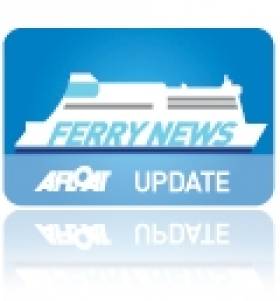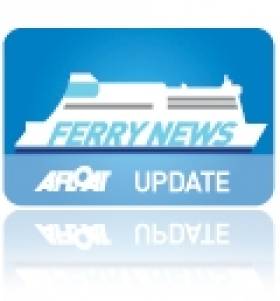Displaying items by tag: HSS FastCraft
Chartered Finnish Ferry Heads for Scotland following Incident
#FinnishFerry –Following an inspection of Finnarrow due to a 'stabiliser incident' in Holyhead at the weekend, the chartered Finnish ferry requires further attention. The 25,996 tonnes vessel, having departed Anglesey today with a tug bound for Scotland, writes Jehan Ashmore.
As previously reported on Afloat.ie, Stena Line yesterday reactivated the fastcraft HSS Stena Explorer, with an earlier than planned opening of the Dun Laoghaire-Holyhead, a seasonal-only operated service which otherwise would not resume until late March.
In the meantime Stena Explorer is providing back-up operations for passengers, in the absence of Finnarrow sailings on the Dublin Port-Holyhead route. A second route ferry, Stena Adventurer, is as usual maintaining sailings on the Dublin Port-Holyhead route.
Passengers due to travel with Stena Line should note the 'latest' information on sailing times. In addition passengers should take particular note of certain sailings for 'foot' passengers and 'vehicle-only' sailings. For information visit: www.stenaline.ie/ferry/latest-sailing-information/
The 'Adventurer's fleetmate Stena Nordica firstly headed for the St. Georges Channel route, having been replaced on the Dublin route by the chartered Finnarrow in late January.
Stena Nordica is currently running Belfast-Cairnryan sailings, while the 'Superfast' sisters each take turns for annual maintenance at Harland & Wolff, Belfast.
Ferry-Go-Round in Run-Up to Boost Capacity for Christmas
#FERRY BOOST - Irish Ferries French route cruiseferry Oscar Wilde as previously reported is to undergo its annual dry-dock maintenance next month, however, she is to operate Christmas and New Year sailings between Rosslare-Pembroke Dock, writes Jehan Ashmore.
In mid-October Afloat.ie reported that the Welsh route cruiseferry Isle of Inishmore is to transfer to Dublin-Holyhead route to boost capacity over the busy festive season.
Each of Isle of Inishmore's sailings will provide space for an additional 2,200 passengers and more than 850 cars. She will join the central corridor route's cruiseferry Ulysses and fast-ferry Jonathan Swift otherwise marketed as the Dublin Swift. For sailing schedules including separate panel for sailings served by Isle of Inishmore click this LINK.
Irish Sea rivals Stena Line are to bring back HSS fast-craft Dun Laoghaire-Holyhead sailings for 12 days over the festive and New Year period, for schedule click HERE. In addition Stena also operate year-round Dublin-Holyhead sailings using two conventional ferries marketed as Superferries.

























































